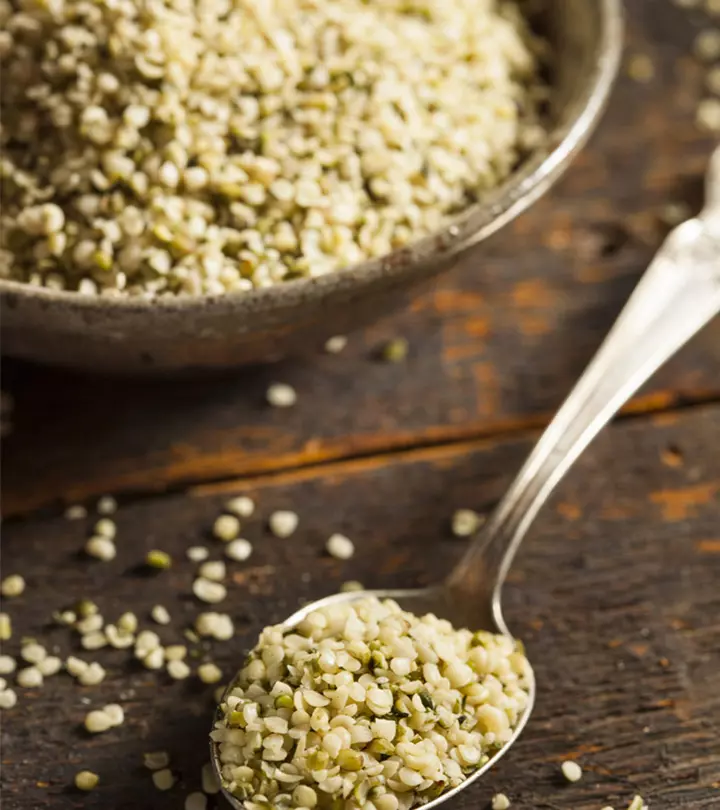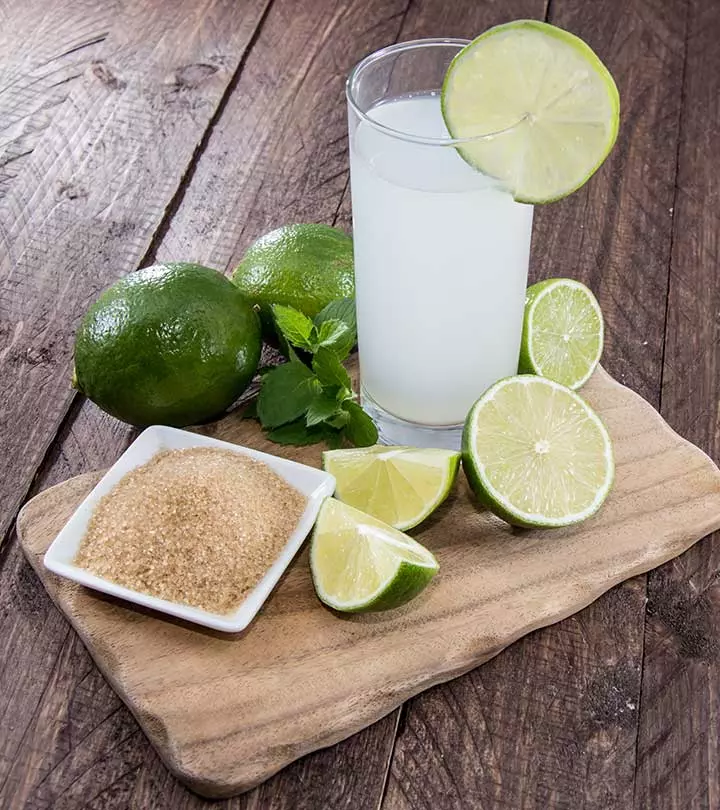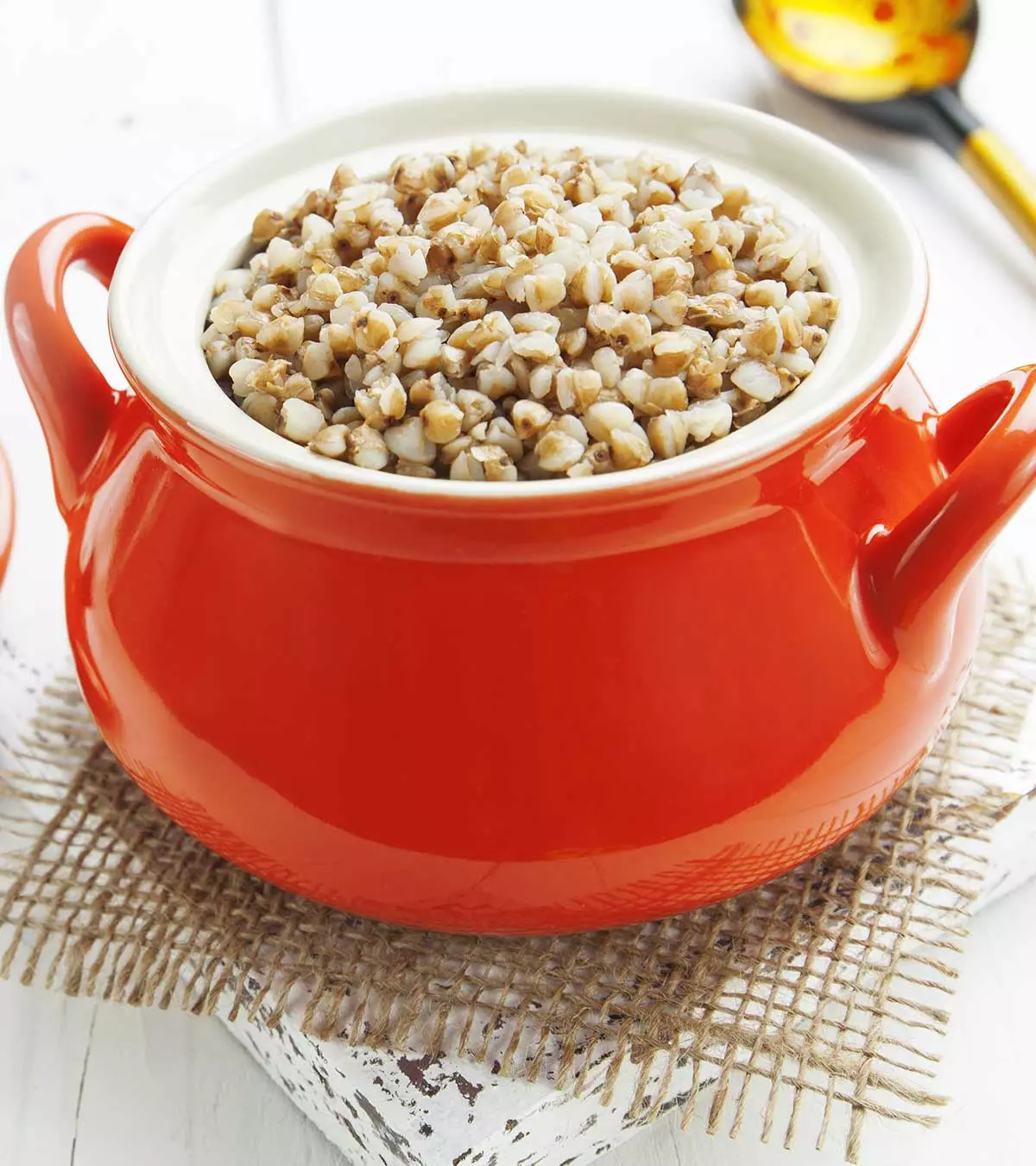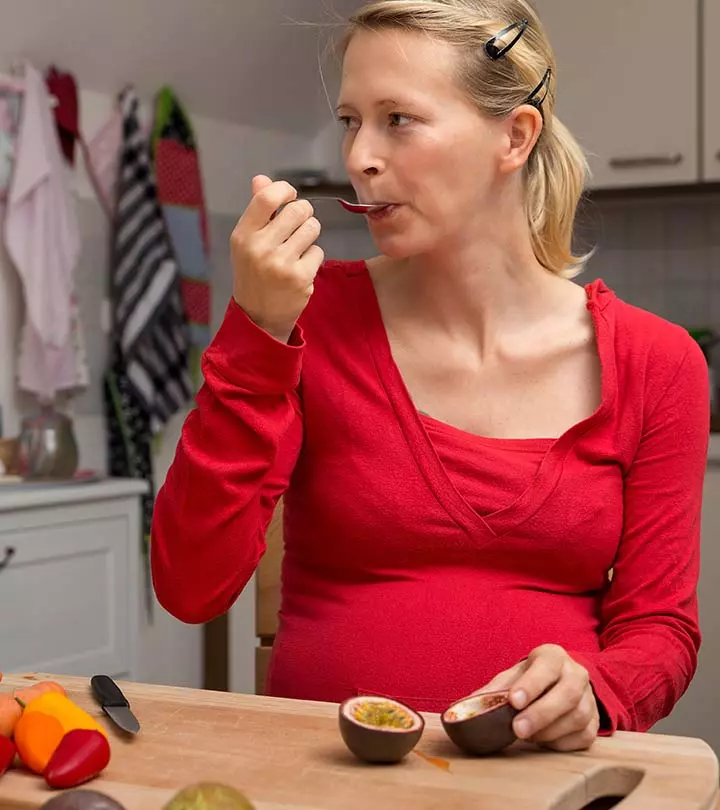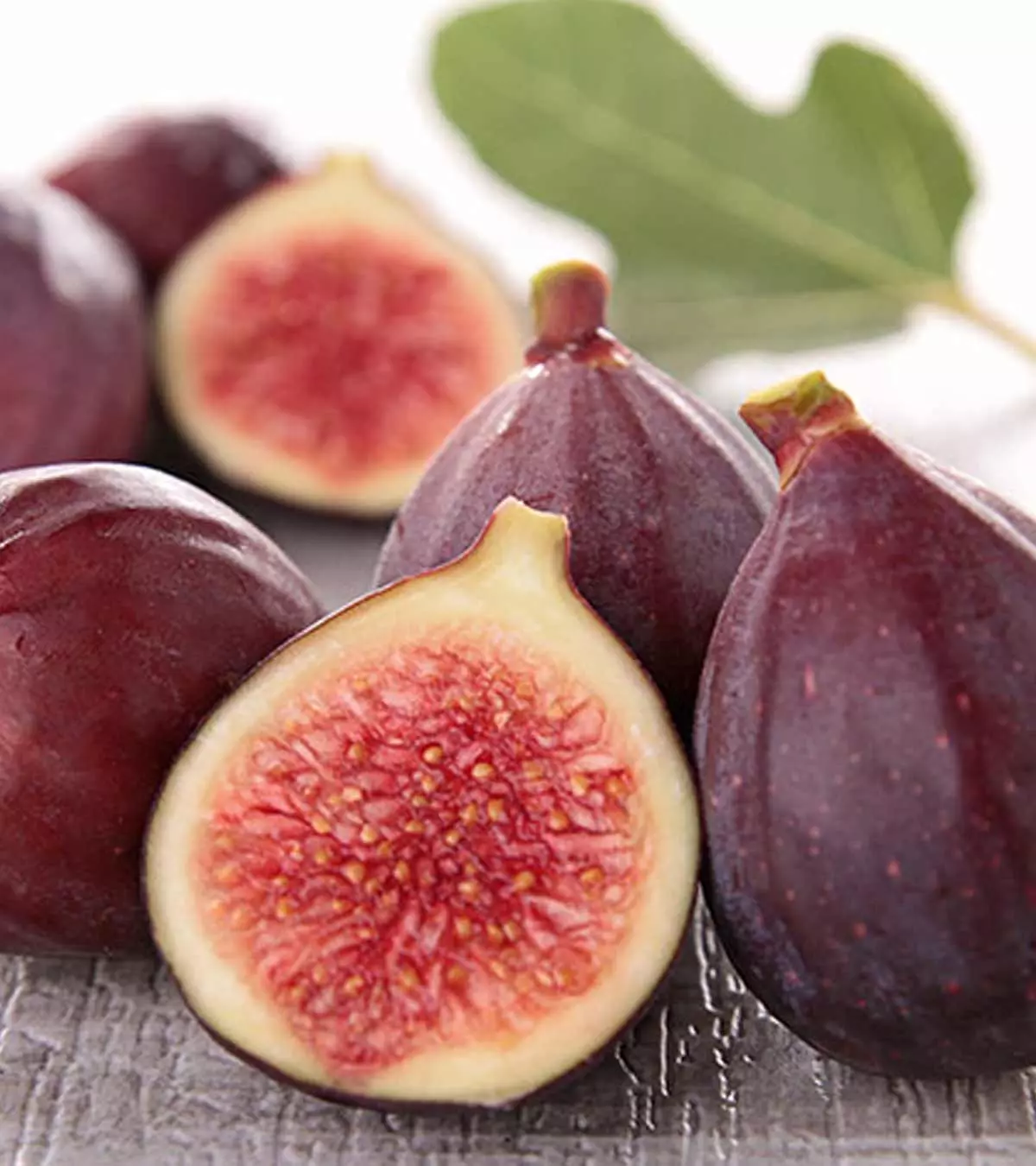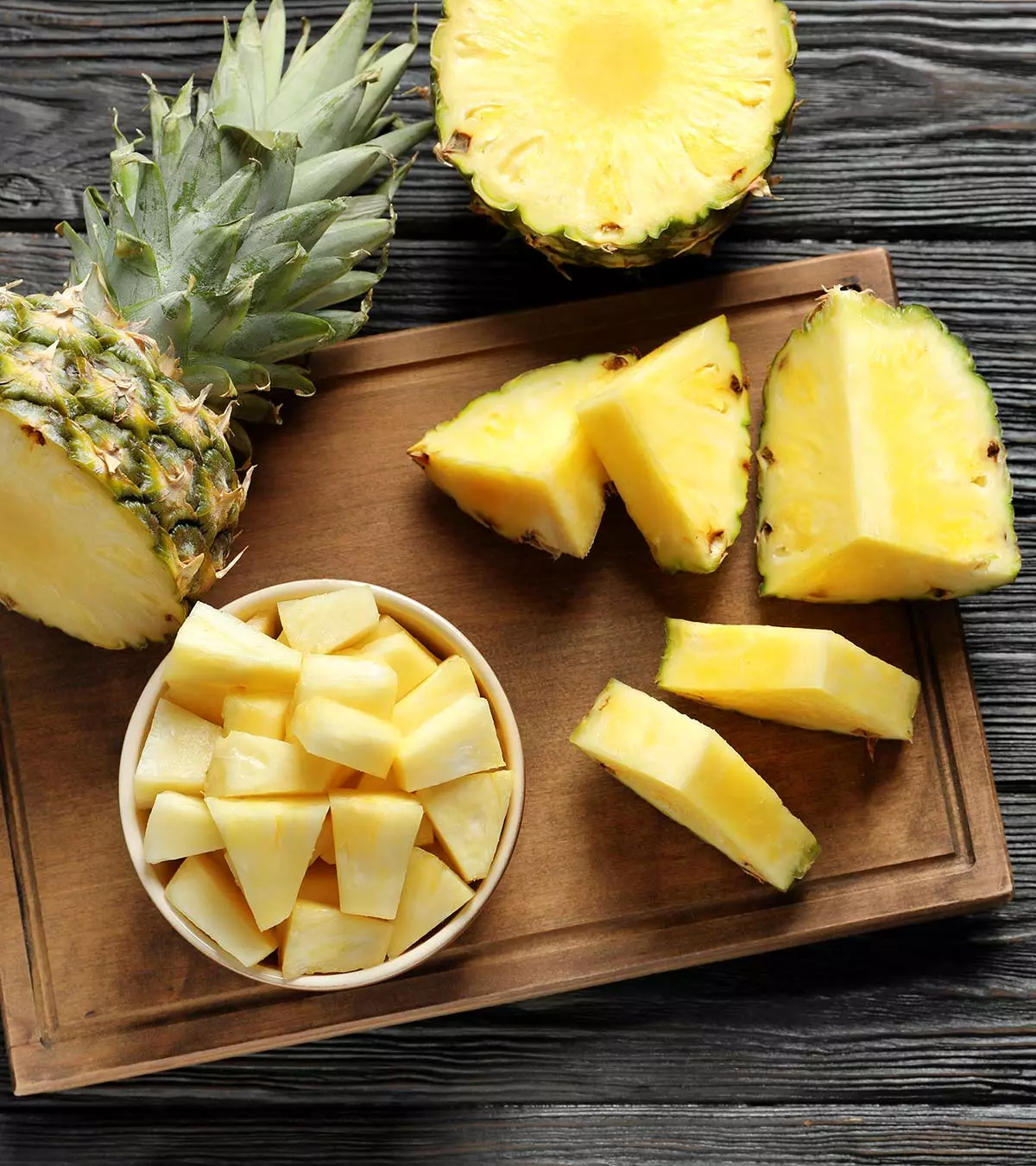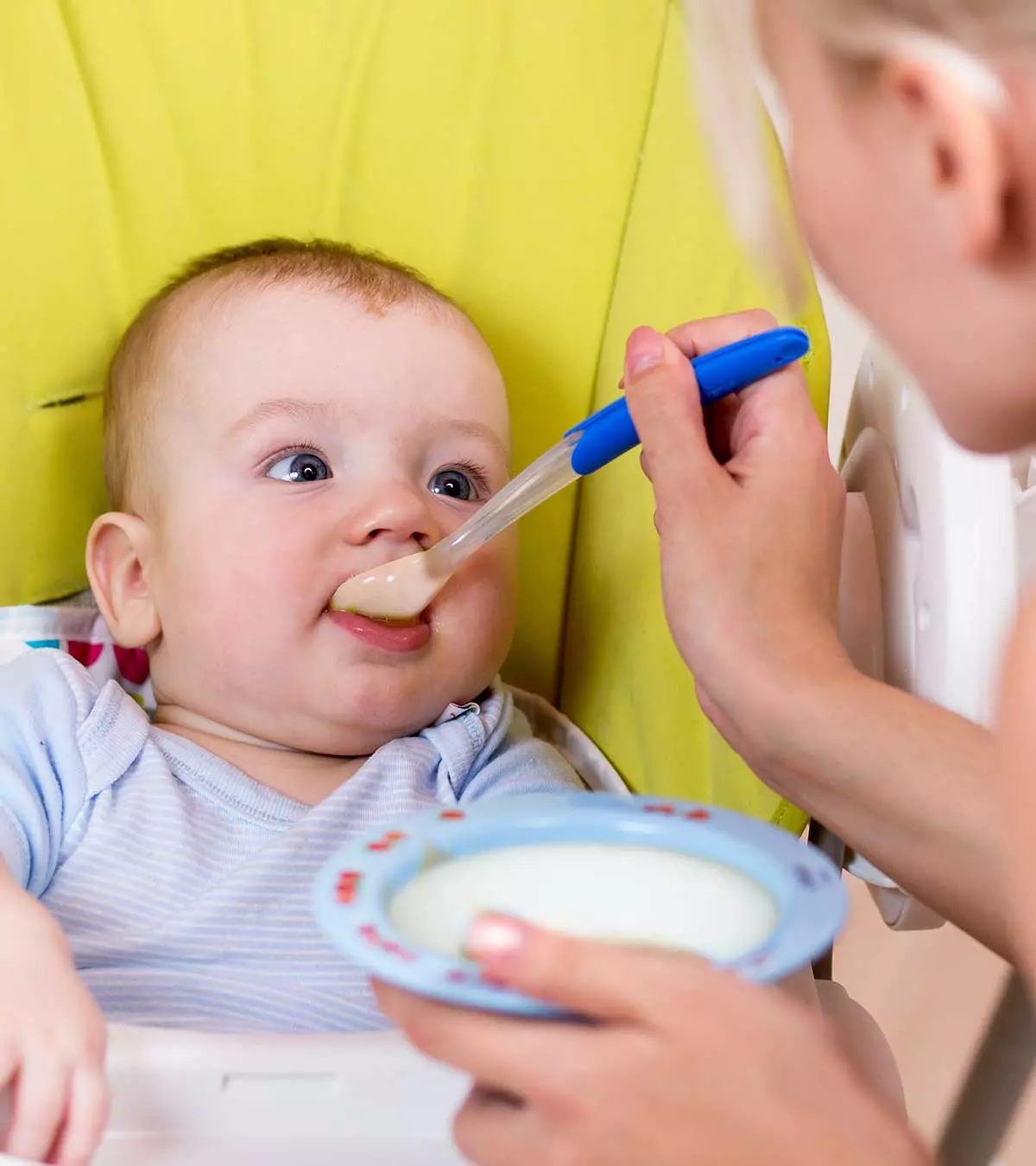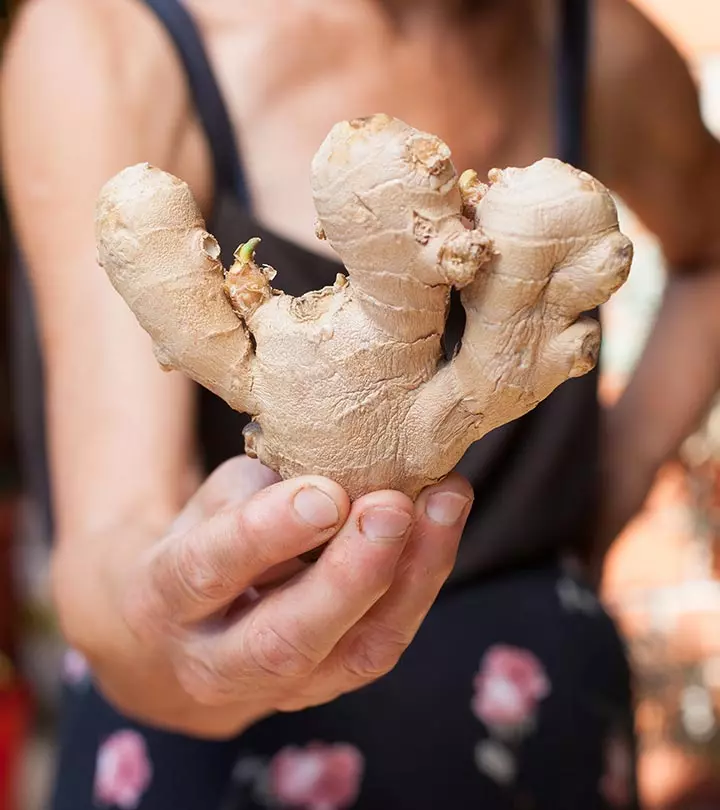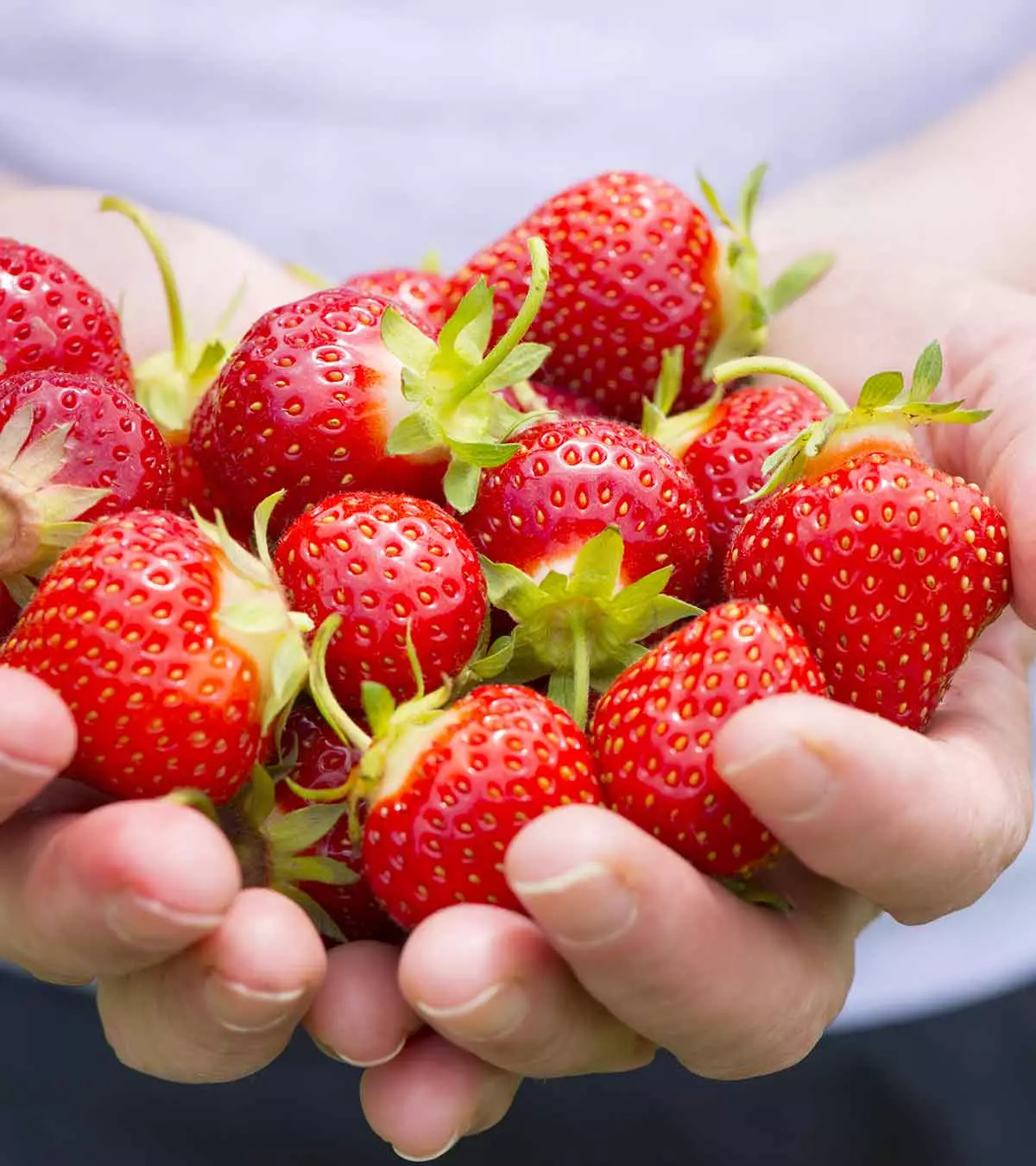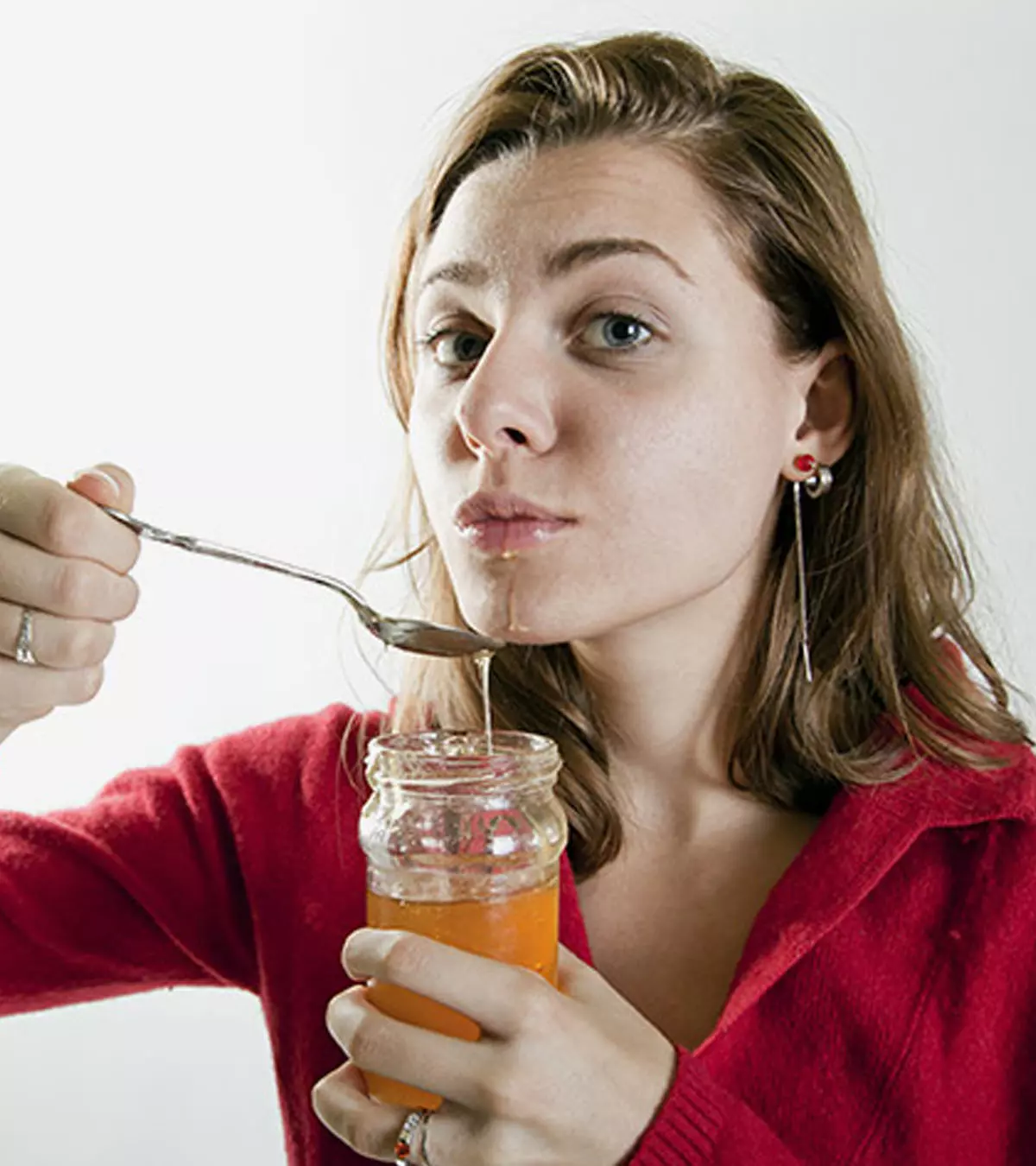
Image: ShutterStock
Having honey while pregnant may be beneficial for your health. Honey is known to contain small amounts of essential prenatal vitamins, minerals, and antioxidants that can be beneficial for both maternal health and fetal development. Be it a cough, cold, or sore throat, honey is a go-to. But is too much honey bad? Read on to know the benefits of honey during pregnancy and the possible side effects.
Key Pointers
- Honey contains rich amounts of minerals, antioxidants, and vitamins.
- Honey consumption during pregnancy is known to improve immune system functioning.
- To reduce botulism risks, consuming only pasteurized honey while pregnant is crucial.
- Overconsumption of honey during pregnancy might lead to insulin sensitivity.
- Make sure to buy honey from trusted sources that are organic.
Is Honey Safe To Eat During Pregnancy?
Expecting mothers often ask the question, ‘Can I eat honey while pregnant?’ The good news is that honey is safe during pregnancy, provided it is pasteurized (1). Also, it should come from a government-certified authority.
One cause of concern about raw honey is that it can cause botulismiA rare but severe infection caused by a toxin that targets the body's nerves, causing breathing difficulties, muscle cramps, etc. (2). However, it only affects infant development if the baby is less than a year old as their digestive system is immature. The gastrointestinal system in adults contains bacteria that prevent botulinum toxin, and it is rare for a pregnant woman to get colonization botulism (3). However, precaution is better than cure, and therefore, it is wise to use only pasteurized honey during pregnancy.
Benefits Of Honey During Pregnancy
Honey comprises water (17%) and two simple sugars, fructose (38%) and glucose (31%). In addition, it offers nutrition as it is enriched with bioactive compounds along with antioxidant properties. However, the concentration of these compounds is very low, and they may not have any significant effect on maternal or infant health (4). It is also believed that the oral intake of honey is beneficial for labor and delivery as it eases labor pain.

Percentage of various constituents of honey
Source: Honey and its nutritional and anti-inflammatory value; BMC Complementary Medicine and TherapiesDr. Daniel Boyer, MD, a practicing doctor at Farr Institute, Iowa, says, “In addition to being high in antioxidants, honey can help soothe the digestive system and make it more acidic. The presence of polyphenolsiA group of chemicals that comprises phenolic acids, flavonoids, lignans, and stilbenes and is present in many plant-based diets and other beneficial compounds in honey may help reduce the risk of complications, including yeast infections and UTIs, during pregnancy.”
Still, honey has a special place in traditional medicine, as it is considered to have therapeutic properties and offers natural remedies that could be considered beneficial during pregnancy.
- Immune system: Ancient literature shows that honey has potential antibacterial and antioxidant properties that aid in immunity. It is also considered to have effective wound healing properties. Its topical application can help treat cuts, wounds, and minor burns, while its oral consumption is believed to provide relief from heartburn (5).
- Insomnia: The use of honey for insomniaiA common sleep disorder that can make it challenging to get to sleep and stay asleep is an age-old practice in Ayurveda. According to ayurvedic literature, honey is considered to have a hypnotic action that could help overcome insomnia. Drinking a glass of milk mixed with a spoon of honey before bedtime is believed to promote undisturbed sleep (6).

- Cold and cough: The use of honey with ginger or lemon is a common home remedy to treat acute cough. With its antiviral properties, honey is believed to inhibit the viral activity in the body, preventing common cold and thus, providing relief from cough as well (7) (8).
 Expert says
Expert says- Sore throat: Ancient Greeks used honey as one of the most popular traditional remedies to treat a sore throat (6), which can be due to a bacterial or viral infection. In both cases, honey is considered to provide some symptomatic relief, as it is believed to have anti-inflammatory properties. You can try adding honey to ginger or lemon tea and drink it warm to relieve a sore throat (9).
Erin Sarile, a pregnancy vlogger, recounts how honey helped soothe her sore throat while she was expecting. She says, “I had my boyfriend, Brian; he heats me some water and squeezes a little lemon in there. I also stirred in some honey, maybe half a tablespoon of honey, which helped ease my throat (i).”
- Ulcers: A research has shown that regular consumption of honey could possibly decrease the growth of Helicobacter pylori bacteria, responsible for causing duodenal ulcersiA tear on the tissue's surface, in the wall of an organ, or the skin (10). However, some studies recommend more randomized clinical trials to prove the efficacy of honey in treating different types of ulcers.
- Scalp health: A research study showed that the anti-fungal, antibacterial properties and antioxidative nature of honey could support in getting rid of dandruff and itchy scalp. Dilute some honey in warm water and apply it to the scalp to treat such hair conditions (11).
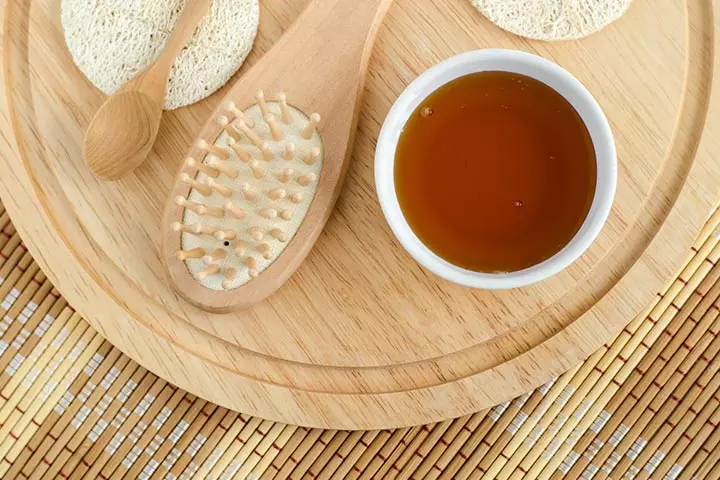
- Allergies: It is believed that regular oral consumption of honey could make the body immune to pollen and seasonal allergies. However, research studies on the subject are inconclusive (12).
- Digestive health: Honey may promote a healthy gut microbiome, which can improve digestion and reduce gastrointestinal discomfort during pregnancy (21).
 Did you know?
Did you know?Side Effects Of Honey During Pregnancy

It is good to maintain dietary restrictions, as an excess of anything may have side-effects. Dr. Boyer opines, “It is important to remember that while honey has many benefits, it can also contain high amounts of sugar. Therefore, pregnant women should be mindful of how much honey they are consuming.”
Excessive consumption of honey can lead to certain side effects, as mentioned below.
- Could aggravate insulin sensitivity: One tablespoon of honey has almost 64 Kcal that primarily comes from simple sugars like fructose and glucose present in it. Excessive consumption of honey could raise blood sugar levels and worsen insulin resistance (13). This could lead to insulin sensitivity during pregnancy, thereby posing a risk of the development of gestational diabetes and blood lipid imbalances (14). According to the US Centers for Disease Control and Prevention (US CDC), gestational diabetes affects around 5 to 9% of expecting mothers in the US each year (23).
- Cramps: Honey contains high amounts of fructose that could cause gastrointestinal issues such as cramping, bloating, and diarrhea (15). This is why honey is considered a source of FODMAP (Fermentable Oligosaccharides, Disaccharides, Monosaccharides, and Polyols). FODMAPs are a group of poorly digested sugars that can cause diarrhea and stomach cramps when consumed in excess (16)
- Dental health: The high levels of sugar in honey could cause dental cavities and tooth erosion.
- Weight gain: One tablespoon of honey has more calories than one tablespoon of refined sugar. Hence, overconsumption of honey, in terms of total calorie intake, could be a potential cause of weight gain (with other relevant factors, such as activity levels, added).
- Medical interactions: Pregnant women taking certain medications, particularly those related to blood sugar regulation or anticoagulants, should consult a healthcare professional before consuming honey, as it may interact with these medications.
 Point to consider
Point to considerHow Much Honey Is Safe During Pregnancy?
There is no documented safe limit for the consumption of honey, especially for pregnant ladies.
Therefore, it is wise to consult a nutritionist to determine the food safety of honey.
When you try to gauge the safe limit, remember that calorie intake from sugar in pregnancy should not exceed more than 10% of the total calorie requirement during pregnancy (which is around 1800 to 2400 calories per day).
Precautions To Take While Eating Honey
There are some ways in which honey should not be taken:
- Do not add honey in hot water or beverages as it might eliminate its healthy enzymes. You may add it to lukewarm water.

- Avoid mixing honey to bean curd as it can reverse the benefits and lead to indigestion.
Tips For Choosing Honey
If the quality of honey is good, consumption should not be an issue, even for pregnant women.
- Double-check if the honey is pasteurized. Almost all brands sell pasteurized honey. However, the honey purchased from roadside sellers, bee farms, or local markets will mostly be raw and hence must be avoided.
- Choose trusted, organic honey as it undergoes minimal processing.
- Consider locally sourced honey over store-bought honey
 Quick tip
Quick tipIf you are unsure of which honey to eat, discuss it with your medical practitioner.
Can You Take Manuka Honey When Pregnant?
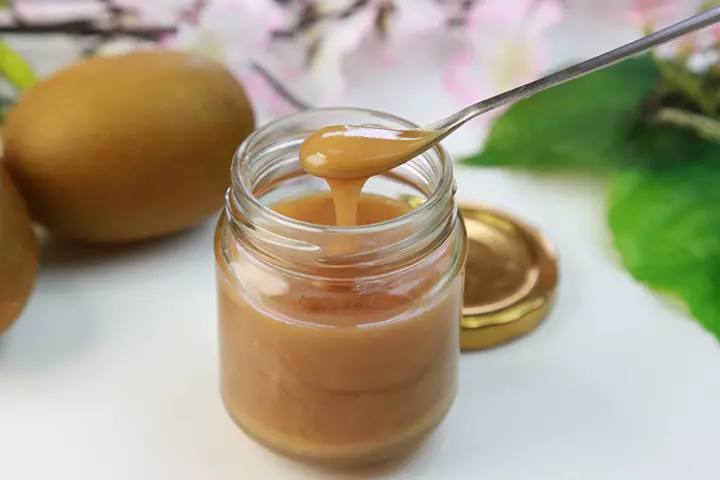
Manuka honey is safe to take unless you are allergic to it. It is natural and healthy, and there is also no evidence that manuka is unsafe for consumption during pregnancy. However, you should check with your doctor or a nutritionist before using it, since there is limited information about its safety (17).
Dr. Boyer recommends, “Manuka honey is safe when pregnant, provided you follow one important rule: only use manuka honey that has been certified as pure and unadulterated. The certification assures you that the honey has not been contaminated with toxic chemicals in manufacturing or storage.”
Frequently Asked Questions
1. Can consuming honey during pregnancy help with digestion?
Yes, some types of honey have antibacterial, anti-inflammatory, and prebiotic activities. It can therefore promote favorable changes in gut microbiota, reduce gut inflammation and infection, and improve digestive health (21).
2. Is it safe for pregnant women to use honey as a sweetener in cooking or baking?
Yes, honey is generally considered safe for pregnant women to consume in moderate amounts, including as a natural sweetener in cooking or baking.
3. Can consuming honey during pregnancy help boost energy levels and reduce fatigue?
Yes, consuming honey during pregnancy can help boost energy levels and reduce fatigue as it increases red blood cell count, oxygen levels, and has a time-release effect (22).
4. Can honey help reduce morning sickness during pregnancy?
Yes, honey can be used to relieve morning sickness by consuming it before breakfast (12).
Consuming honey while pregnant is beneficial for both the expectant mother and the fetus. It is safe during gestation and comes with various health benefits. For example, it helps improve the immune system, prevent insomnia, and cure cold and cough. However, ensure you consume honey in moderation since overconsumption may lead to health complications. Also, buy from trusted brands that sell pasteurized honey since adulterated honey can negatively affect your body. In addition, avoid mixing honey in hot water and beverages since it may reduce its effectiveness.
Infographic: Side Effects Of Honey During Pregnancy
Everyone is aware of the benefits honey has to offer. But it should also be known that its overconsumption might have certain side effects too, especially in pregnant women. Read the following infographic to learn about them, and pass on the information to others as well. Illustration: Momjunction Design Team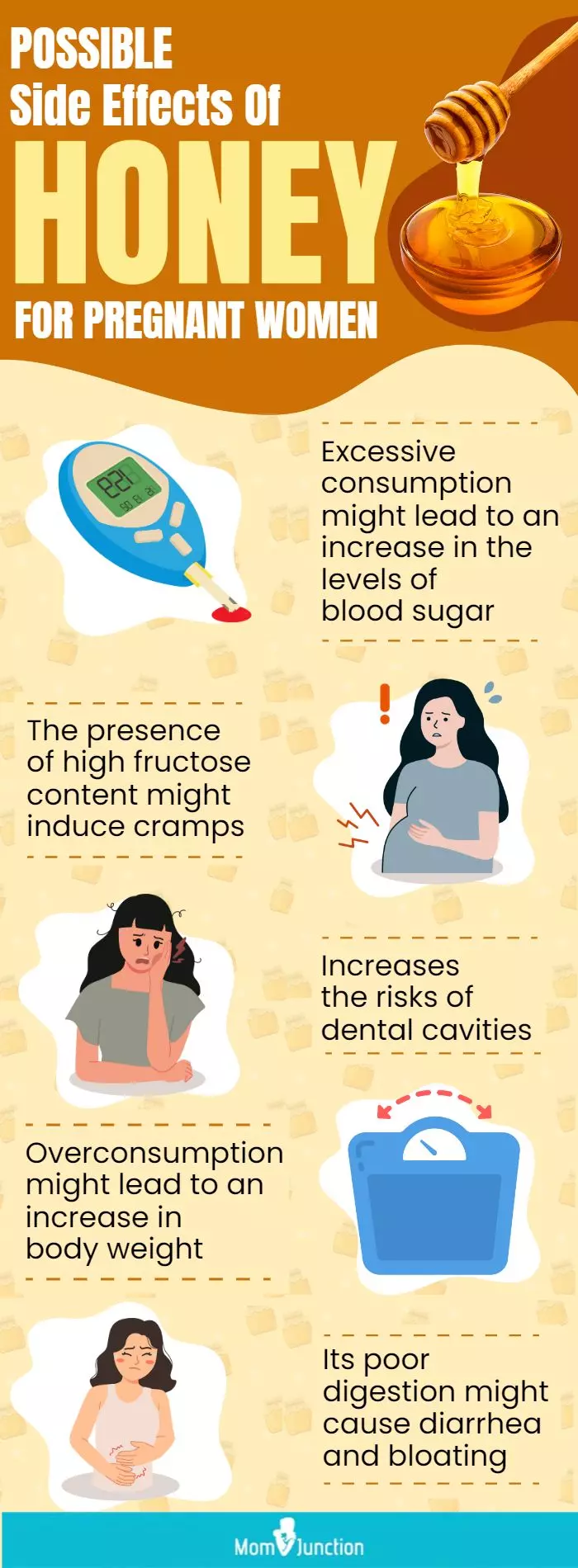
Illustration: Possible Health Benefits Of Eating Honey In Pregnancy

Image: Stable Diffusion/MomJunction Design Team
Honey can be tempting to eat when pregnant. However, it is important to know the risks involved before consuming. The video below shares it and more for you to take an informed decision.
Personal Experience: Source
MomJunction articles include first-hand experiences to provide you with better insights through real-life narratives. Here are the sources of personal accounts referenced in this article.
i. Quick & easy cold/flu remedies while pregnant;https://www.youtube.com/watch?feature=shared&v=hy-FhCY4K8w
References
1.Eating well in pregnancy; NHS
2.Infant botulism; Medline Plus; U.S National Library of Medicine
3.Carolyn Tam et al.; Food-borne illnesses during pregnancy; National Center For Biotechnology Information (2010)
4.Waris A et al.; Randomised Double Blind Study To Compare Effectiveness Of Honey Salbutamol And Placeb In Treatment Of Cough In Children With Common Cold; National Center For Biotechnology Information (2014)
5.Dr. Bassam Zeina et al.; Effect of Honey versus Thyme on Rubella Virus Survival in Vitro; Liebert Pub
6.Tahereh Eteraf-Oskouei and Moslem Najafi; Traditional and Modern Uses of Natural Honey in Human Diseases: A Review; National Center For Biotechnology Information
7.Manisha Deb Mandal and Shyamapada Mandal; Honey: its medicinal property and antibacterial activity; National Center For Biotechnology Information
8.Honey for health?; Harvard Health Publishing
9.Seasonal Allergies and Complementary Health Approaches: What the Science Says; National Center for Complementary and Integrative Health
10.Al-Waili NS; Therapeutic and prophylactic effects of crude honey on chronic seborrheic dermatitis and dandruff.; National Center For Biotechnology Information
11.Basil C Nzeako and Faiza Al-Namaani; The Antibacterial Activity of Honey on Helicobacter Pylori; National Center For Biotechnology Information
12.E. R. H. S. S. Ediriweera and N. Y. S. Premarathna; Medicinal and cosmetic uses of Bee’s Honey – A review; National Center For Biotechnology Information
13.Nataly Martini; Manuka Honey; CSIRO
14.Is something in your diet causing diarrhea?; Harvard Health Publishing
15What Is The Low FODMAP Diet?American Academy Of Nutrition And Dietetics
16.Gestational Diabetes Mellitus (GDM); Johns Hopkins Medicine
17.Salwa W Rizkalla; Health implications of fructose consumption:A review of recent data; National Center For Biotechnology Information
18. The Pregnancy Book; NHS
19. Allam M Abdelmonem et al.; Bee-honey and yogurt: a novel mixture for treating patients with vulvovaginal candidiasis during pregnancy; National Center For Biotechnology Information
20. Sake Juli Martina et al.; Antiplatelet Effectivity between Aspirin with Honey on Cardiovascular Disease Based on Bleeding Time Taken on Mice; National Center For Biotechnology Information
21.The Potential of Honey as a Prebiotic Food to Re-engineer the Gut Microbiome Toward a Healthy State; PubMed Central
22.10 Amazing Health Benefits of Honey; Lifehack
23.Gestational Diabetes; CDC
Community Experiences
Join the conversation and become a part of our nurturing community! Share your stories, experiences, and insights to connect with fellow parents.
Read full bio of Dr. Shikha Sharma
- Dr. Daniel Boyer is a practicing Doctor of medicine at Carabobo Football Club, Dallas, Texas. He did his BS from Liceo Carabobo and MD from Carabobo’s University.
 Dr. Daniel Boyer is a practicing Doctor of medicine at Carabobo Football Club, Dallas, Texas. He did his BS from Liceo Carabobo and MD from Carabobo’s University.
Dr. Daniel Boyer is a practicing Doctor of medicine at Carabobo Football Club, Dallas, Texas. He did his BS from Liceo Carabobo and MD from Carabobo’s University.
Read full bio of Rebecca Malachi
Read full bio of Swati Patwal
Read full bio of Dr. Joyani Das











